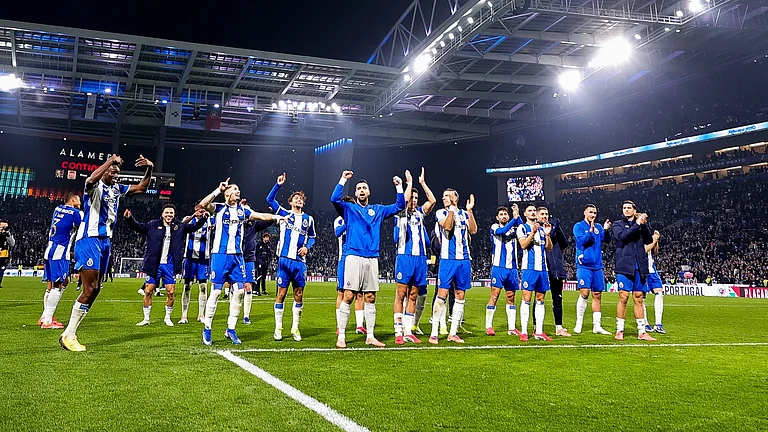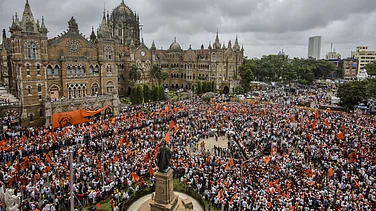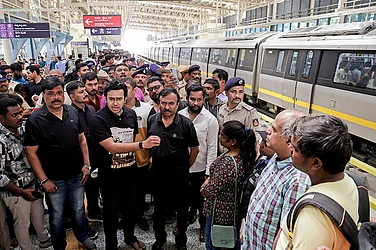To Shri Arvind Kejriwal,
Founder, Aam Aadmi Party and
Chief Minister, Delhi
CC: Shri Yogendra Yadav, Shri Prashant Bhushan
Our Demands
- Remove Somnath Bharti from his position as Law Minister immediately
- Punish all those, including Somnath Bharti, guilty of instigating and perpetrating racist and sexual violence on African women
- Delhi Police must come under Delhi Government, but Delhi Police must be accountable to Constitution and not to the bidding of Ministers and mobs
- Meet and apologise to the Ugandan women who have complained of racist, sexual violence
Dear Shri Arvind Kejriwal,
We are writing this to express our disquiet and distress at the unfolding saga of racist and xenophobic vigilantism that the AAP Government of Delhi is currently defending.
You and your team that includes eminent social scientists and human rights lawyers, is in denial mode today regarding the racist acts led by your Law Minister, Somnath Bharti. All of you have claimed that the Minister was only asking the Delhi Police to crack down on ‘drug and sex rackets’, and that at worst he’s guilty of ‘politically incorrect’ choice of words. You have all told us that the Minister was merely championing the local people’s complaints about the ‘crime’ of ‘prostitution’, ‘drug trade’ and ‘police corruption,’ and that it is the media, (not the Minister or the locals), that have chosen to focus on the racial identity of the ‘criminals’. We would, therefore, like to tell you that in our view, Somnath Bharti’s own description of the ‘raid’ that he led, confirms our concerns about racism.
‘They are not like you or me’
On the night in question, Somnath Bharti arrived with media channels and Delhi Police, and a crowd of his supporters. He told the media “I have received a lot of complaints from women in this locality against foreign nationals, yeh hum aur aap jaise nahin hain (They are not like you or me)”
Is it not a copybook case of racism, to argue that ‘foreign nationals’ are ‘not like us’?
Nigerian Prostitutes vs ‘local ma behen beti’
Interacting with the media that night, he said that “Nigerians girls and men all indulge in prostitution and drug trafficking”, posing a threat to “local ma, behen, beti.” You can hear him say this on this video link:
Is it not racist to allege that an entire community of Africans are prostitutes and drug traffickers? Isn’t it copybook racism to profile ‘foreigners’ as a threat to the safety of ‘local’ women? Hasn’t it been a routine ploy of racism (and communalism and casteism) to profile the targeted community as a threat to the safety of ‘our’ women?
Clear case of profiling
Somnath Bharti’s words do not identify specific individuals as criminals: he refers to any and every person of African nationality as a criminal. And his actions went on to target any and every African, irrespective of any proof against specific individuals. Has the Minister not profiled an entire community as ‘criminal’, much as the colonial rulers profiled entire tribes as ‘criminal’?
That night, he has told media he spotted several African women standing near a car, and they fled when they saw him. He asked his supporters to ‘catch them’; two were ‘caught and handed over to the police.’ He said a car then drew up with three African women in it; and he asked people to stop the car, and hand the three women over to the police van. What basis did Mr Bharti have to assume these women were criminals— except their race/colour and the fact that they were out on a street at night? Is this not a copybook case of racist, sexist witch-hunt of unknown women, based purely on the fact that they were the ‘wrong’ colour and out at the ‘wrong’ time of night? The ‘sting operation’ conducted by a channel to purportedly expose an African sex worker, is dubbed ‘black beauty’— again, a copybook phrase redolent of racist sexism!
Racist witch-hunt
In the same video link, Mr Bharti can be seen demanding that the police raid each and every single home in a building said to be occupied by African nationals. The police refused. The next morning, media reports say, Mr Bharti again went to Khirkee Extension, and addressed people, saying “I am here to solve your problems. I request you to make a list of houses jahan aise log rehte hain (where such people live). I will be visiting each of these houses and I will urge the police to do the same. I have taken a vow to put an end to such things in this area.”
When a minister demands that the police raid each and every home of Africans; when he asks people to list such homes and threatens to ‘visit’ each such home to check for prostitution and drugs, can we fail to recognise it as a classic racist witch-hunt?
Protector of Constitution turns perpetrator, hands over women to mob
The Minister asked his supporters to ‘catch’ fleeing, terrified African women and ‘hand them over’ to the police. When a mob lays hands on women who have been branded in prurient imagination as ‘prostitutes’ and as the ‘foreign’ sexual ‘other’ of ‘ma, behen, beti’, wasn’t sexual violence against these women, virtually inevitable? Is it not flagrantly illegal on the Ministers part to endanger the women by asking an agitated crowd to ‘catch’ them? These Ugandan women have alleged that they were beaten, groped sexually. On what basis do you deem these allegations to be false? ?There is no basis whatsoever to assume that all the African women concerned are prostitutes. But is a Minister justified in asking a mob to ‘catch women’ even if they are indeed prostitutes? Is it the Government’s contention that only ‘ma, behen, beti’ are entitled to safety and dignity— and that prostitutes can be left to the mercy of moralistic mobs? ?Are human rights mere niceties that can be done away with? Can a Minister insist that a Police officer conduct sweeping, indiscriminate raids, minus any search warrant and other due processes? Without any other evidence, can women be forced to undergo drug tests only because of their race and nationality? The drug tests and cavity searches to which these women were subjected, turned up negative: when do you plan to apologise to them for the false allegation and the indignity, not to mention the groping they suffered at the hands of your Minister’s supporters?
Racist politics and violence
The African residents of Khirkee, as well as Indians who have been working amongst them for quite a long time, the Khirkee Extension RWA has been activated on the plank of anti-African hatred. They say there have been several instances of brutal violence, sexual harassment and groping, against African women in Khirkee Extension, and even instances of stoning of African women and children. The police, they say, used to be insensitive to the complaints of the Africans. Meanwhile, there were several racist complaints made to the police about the ‘stink’ of African food and the ‘short skirts’ worn by African women, and complaints by the RWA accusing the Africans of ‘drugs’ and ‘prostitution’. But after repeated, patient intervention by those making anti-racist efforts, the police did respond, and according to the Africans and their Indian friends, the Malviya Nagar SHO Vijay Pal had become more sensitive in his dealings with the African community, and acted to protect the African women on the night of the raid. Today, this SHO has been penalised— for failing to obey the orders of the Minister who expected him to indiscriminately raid the homes of all people of African nationalities. This sends a dangerous message to the Police— that if they uphold democratic rights of vulnerable individuals or groups as mandated by the Constitution, instead of succumbing to political pressure and the sentiments of an inflamed crowd, they will be penalised.
If the issue were really one of a few individual criminals, the Minister would have cited specific intelligence inputs, specific names, and sought a search warrant and raid of those suspected individuals. When the Police are asked to indiscriminately raid/arrest all persons of a particular race or community, is it not the duty of the Police, in a democracy, to refuse?
Model of Resolving Disputes
We understand that your Minister was concerned about the complaints of people against alleged drug and prostitution rackets. We ask— why was he unconcerned about the evidence of long-standing racist violence and discrimination, which had been brought to his notice by activists in the area? The AAP has spoken of building institutions like mohalla sabhas. Why could your Minister— or you yourself— make no attempt to hold such sabhas with both African and non-African communities, facilitating dialogue, dissolving prejudice and myths, and addressing all genuine issues? Why did Somnath Bharti, instead, act on the complaints of one side alone? Why did he indulge in utterances calculated to further inflame racist and sexist passions against Africans, especially African women? Once again on 19th January, Mr Bharti addressed a crowd in Khirki extension, stoking passions by warning Africans that ““Good people, irrespective of their nationality, who are here to study or work, they will be welcomed. However, if they dance naked, sell drugs and run sex rackets, then there won’t be anyone worse than us. These people will have to leave” and that “vulgar people won’t be allowed to remain in India”
The role of the police
When you held your dharna, you claimed that your main aim was to bring the Delhi Police under the Delhi Government— a goal which we support. But you have raised your dharna without any commitment from the Centre on this supposedly central demand! Instead, you raised the dharna following disciplinary action against two SHOs including the Malviya Nagar SHO. It’s quite apparent to us here that the dharna’s aim was not police reform or accountability of the police— but to embolden your Minister and penalise the police officer who refused to cooperate with his racist raid. You personally claimed that the Ugandan High Commission had written approving of Mr Bharti’s raid. Did you bother to verify the veracity of the letter before using it to try and cloak your Minister’s racism with a facade of approval from the Ugandan Government?
Where religious minorities, oppressed castes, stigmatised races/ethnicities (such as Blacks or people from the North East), women, gay people and transgenders are concerned, do we not expect sensitivity on part of the Police and elected representatives? When it comes to such vulnerable social groups that are at the receiving end of bias, do we not expect the Police to act in accordance with Constitutional values of justice, rather than to do the bidding of a Minister or a mob?
- We expect you to consider the ample and undeniable evidence of racism on Mr Bharti’s part, and remove him from his post as Minister.
- We also call upon the AAP to initiate disciplinary action under AAP’s own rules, against Mr Bharti for his racist hate-mongering.
- We also call upon you to initiate a public dialogue with the Ugandan women who have alleged sexual violence and with the African people of Khirki Extension, and issue a public apology to them all.
- We demand that you probe and punish all those along with Mr Bharti, who indulged in mob violence and sexual violence against the Ugandan women.
These measures are an urgent necessity to diffuse the ugly racism that is escalating day by day.
One of the Iandlords who had rented rooms to Ugandans and had defended their rights, was subjected to stoning. The Africans of Khirki Extension and their Indian friends are in a state of insecurity and terror.
Delhi, for centuries, has an enviable history of inclusive, cosmopolitan culture. At the same time, Delhi is also known for an ugly underbelly of racist and regionalist prejudice against people from the North East, against migrants from Bihar, against black people, and of course of sexism against women. We expect your party and your Government to ensure that your actions are informed by the highest standards of inclusivity and democratic values. Unfortunately, your attitude towards your Law Minister’s inexcusable conduct does not reassure us in this direction.
[You can add your signatures to the petition here]
The Undersigned,
1. Kavita Srivastava, PUCL
2. Kalpana Mehta, Manasi Swasthya Sansthan, Indore
3. Dunu Roy, Hazards Centre
4. Nivedita Menon, JNU
5. Pamela Philipose
6. Saba Dewan, Film maker, New Delhi
7. Amit Bhaduri, economist
8. Nirmalangshu Mukherjee, Delhi University
9. Uma Chakravarti, historian
10. Suneeta Dhar, Jagori
11. G. Arunima, Associate Professor, Centre for Women’s Studies School of Social Sciences, Jawaharlal Nehru University
12. Nandini Sundar, Delhi University
13. Satya Sivaraman
14. Malini Kochupillai
15. Rakhi Sehgal, Labour Activist, New Delhi
16. Harsh Kapoor
17. Shuddhabrata Sengupta, artist and writer, Raqs Media Collective
18. Benny Kuruvilla, Researcher, New Delhi
19. Jacintha Kumarswamy, Sakti, Bangalore
20. Madhu Bhaduri
21. Umakant, Independent Researcher and Human Rights Advocate
22. Sabeena Gadihoke, Associate Professor Video & Television Production, AJK MCRC, Jamia Millia Islamia
23. Shohini Ghosh, Professor, AJK MCRC, Jamia Millia islamia
24. Sohail Akbar, Associate Professor Still Photography AJK Mass Communication Research Centre Jamia Millia Islamia
25. Jai Sen, CACIM
26. Sabina Kidwai
27. Ann Ninan
28. Shachi Chaturvedi, citizen and concerned woman, New Delhi
29. Shashwati Talukdar
30. Radha Khan, feminist, New Delhi/Gurgaon
31. Ashis Nayanar
32. Urvashi Wattal
33. Meenakshi Ganguly
34. Madhu and Shruti, Research Team at Jagori, New Delhi
35. Nirmala Karunan, activist
36. Veenu Shah
37. Chintan Upadhyay
38. Kavita Krishnan, AIPWA
39. Usha Saxena, feminist and activist, Gurgaon/Delhi
40. Manola K. Gayatri, PhD Fellow JNU
41. Kamayani Bali Mahabal, feminist and human rights activist, Mumbai
42. Om Prasad, PhD Scholar JNU, AISA
43. Aastha Chauhan, artist
44. Shveta Sarda, writer and translator
45. Aarti Sethi, PhD Scholar, Columbia University
46. Monica Narula, Artist, Raqs Media Collective
47. Shivam Vij, journalist
48. Gautam Bhan, faculty, Indian Institute of Human Settlement
49. Jeebesh Bagchi, Artist, Raqs Media Collective
50. Iram Ghufran, filmmaker






















